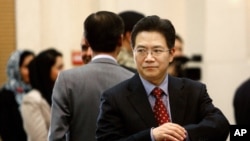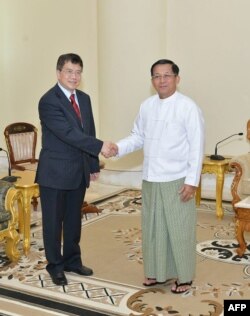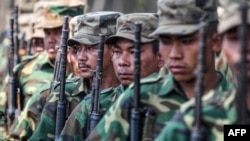China’s special envoy to Myanmar held a third round of meetings in four months last week with several of Myanmar's most powerful armed rebel groups, some of them battling the military for control of the borderland area two years after the coup that brought the military to power.
The ethnic armed organizations, or EAOs, have semi- or fully autonomous enclaves in Myanmar’s northeast, which borders Yunnan for 2,000 kilometers, and they have formed an alliance called the Federal Political Negotiation and Consultative Committee.
Analysts say the envoy, Deng Xijun, is looking not only to secure China’s economic interests in neighboring Myanmar amid the post-coup chaos but also to preserve its sway among the armed groups ahead of an expected surge in U.S. engagement.
Referring to Deng’s flurry of meetings, Ja Ian Chong, an expert on Chinese foreign policy at the National University of Singapore, told VOA during an interview by phone, “The frequency and the scale is unprecedented.”
“But also we have to remember that Myanmar is in pretty unprecedented territory, and I think Beijing recognizes that. So ... because of the complicated situation, they’re stepping up their efforts to protect their interests in the country,” he said.
Billions invested
Deng met last week with representatives of the consultative committee in Kunming, the capital of China’s Yunnan province. He met last month with the groups in rebel-held territory inside Myanmar, after their first round of meetings in Yunnan in December, just after Deng assumed the envoy post.
China has billions of dollars invested in energy and infrastructure projects across Myanmar and has kept up relations for decades both with the country’s central government and the armed groups arrayed against it.
Because the pandemic and post-coup chaos put many of the projects and meetings on hold, Deng’s meetings are China’s attempt to make up for lost time, according to Yun Sun, who heads the China Program at the Stimson Center, a U.S. think tank.
“China has just come out of a three-year isolation. With everything that has happened in Myanmar and the reopening of the border, there is a natural momentum in Beijing to pick up where it was left,” she said.
The key components of China’s projects in Myanmar are the oil and gas pipelines that cut across the country — including some rebel-held territory — from Yunnan to the Bay of Bengal, part of the so-called China-Myanmar Economic Corridor. Earlier this month, junta spokesman Zaw Min Tun told VOA Burmese the two countries also had renewed talks on adding a high-speed rail line to the same route.
To protect those interests and push them forward, China needs its border areas with Myanmar stabilized, said Jason Tower, Myanmar program director for the United States Institute of Peace, a Washington think tank set up by the U.S. Congress.
To that end, he said, Deng has been pushing the rebel groups along the border to strike a truce or cease-fire with the military and to choke off the supply routes feeding arms and ammunition to the smaller militias that have sprung up against the junta since the coup.
Of the seven EAOs that Deng has been meeting with, three are also fighting the junta themselves.
Tower said Washington’s growing ties with the resistance are likely to be spurring China on as well.
The National Unity Government, a shadow administration working both inside and outside Myanmar to oust the junta, opened an office in Washington in February. Late last year, Congress also passed the BURMA Act as part of a national defense budget for 2023. The act authorizes “technical support and nonlethal assistance” to both the rebel armies and militias fighting the junta.
“That envoy [Deng] has been sending out some pretty clear messages to the EAOs about limiting their interactions with the NUG, about limiting weapons flows to some of the pro-democracy actors,” Tower said.
“Some of the conversations have been quite specific in terms of indicating to the EAOs ... not to be engaging with Western stakeholders, and then asking that they engage the regime, putting pressure on them to get more deeply engaged in the peace talks,” he said.
Some anxiety
Additionally, Deng’s burst of meetings with the armed groups suggests Beijing is growing anxious about its goals in Myanmar losing ground to Washington’s, Chong noted.
“We’ve seen now that the PRC sort of sees the U.S. as a fairly challenging rival,” he said, citing a speech by Chinese leader Xi Jinping earlier this month accusing Washington of trying to stymie China’s rise.
“In light of that, I think Beijing will probably want to make sure that they maintain an ability to work with the EAOs, that the EAOs don’t go too far along in terms of working with Washington and potentially leaving Beijing and its interests high and dry,” he added.
Richard Horsey, a senior adviser on Myanmar to the International Crisis Group, said the EAOs on China’s border are mostly pursuing their own goals. He said some of them are helping to arm, train or fight alongside the anti-junta militias, even engaging with the NUG, to the extent their goals overlap.
China’s overriding goal, he added, is to see that fighting and refugees don’t spill over the border, and that its projects inside Myanmar are safe, by helping broker a deal between the EAOs and military that might curb the violence.
Besides his meeting with the armed groups, Deng has met twice with leaders of the Myanmar junta in Naypyitaw, the capital.
“China is not primarily concerned with undermining the resistance, although it does worry about the security of its economic assets in Myanmar, which have been threatened and in some cases attacked by resistance groups,” Horsey said.
"So, Deng’s stepped-up diplomacy is not primarily related to the NUG or the resistance and is more about influencing the security environment along its border.”
No objections
For its part, the NUG says it has no qualms about Deng’s meetings with the rebel armies.
“The Chinese will express their concern and their interests and their opinion, and the EAOs will listen, and the EAOs will make their own decision that’s best for their region and their people,” NUG spokesman Kyaw Zaw said to VOA.
Ultimately, though, it will be in China’s interests to side with those groups vying to bring democracy back to Myanmar, he said.
Myanmar’s military leaders “are the ones that are creating the violence and instability, so the Chinese’ best interests will be supporting the pro-democracy movement and siding with the people of Myanmar. This way will guarantee long-term stability and prosperity for both countries,” the spokesman said.







